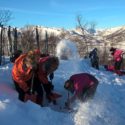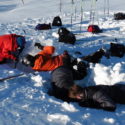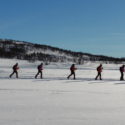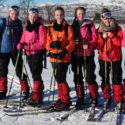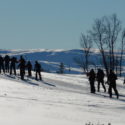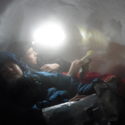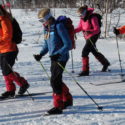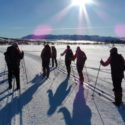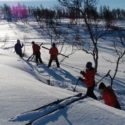Thirty three year ten cadets from the Canford School CCF consumed with excitement and anticipation, together with three teaching staff and seven instructors converged on Hovden at the southern end of the Norwegian mountains on a cold clear and starry evening in February to be met by the chief instructor from GoAdventure1 on the eve of Canford’s annual pilgrimage to experience the challenges and delights of cross-country skiing and arctic survival.
The aim was to the cadets to Nordic Skiing whilst teaching them basic elements of survival in the arctic and thereafter conducting a three day expedition sleeping out in a snowhole for one of the nights. The trip was designed to challenge the cadets, taking them beyond any previous limit of comfort, confidence or familiarity, thereby developing key life skills.
Tentative steps early next morning in the ski tracks quickly gave way to more ambitious relay races, touch rugby and tag games as the cadets grew in confidence over two days under the crystal skies and over the powdery glistening snow. Small clutches of figures in red Goretex tops could be seen tumbling about the vast expanses of stunted birch growing ever more confident and adventurous. On the third day the basic elements of snow survival were added into the skill set with snow caves, snow mounds and snow holes as well as Quincy shelters, bothies, snow profiles, transceivers, probes all becoming part of the cadets’ vocabulary. The third day closed somewhat nervously as bergens were packed and pulks loaded on the eve of the big back-country expedition which would see the cadets covering nearly 45 km in all.
The cadets set off early next morning with some stunning pink clouds drifting in from the West, but heading more sedately now, heavily laden, for their snow holes. After much digging and scraping the first day closed with tired bodies crawling into their sleeping bags in a mixture of huts, Quincies or snow mounds and snow caves to enjoy a welcome compo meal and some hot chocolate. Sleep overcame all quickly after an exhausting day where the cadets surprised themselves and surpassed expectations. By late evening however two of the snow caves through lack of any real depth of snow (Norway has along with the rest of Europe suffered from a lack of snow this season) had begun to sag and the occupants beat a hasty retreat to the huts nearby. The Quincy mounds however were a triumph and the girls on the expedition led the way and were the first to spend a night under ice.
The second day dawned warm and misty as the cadets rose themselves and once again heaved their rucksacks onto their shoulders and stepped steadily off towards their second night’s camp. Warm slippery snow challenged the wax on the skis and made for hard work as the fourteen year old boys and girls pushed on through the mist moving slowly from one birch whip to the next with the lack of any visibility challenging any measure of progress and with it the cadets’ morale. Gradually each group reached their destination to start building more Quincy shelters or occupying ones from the night before; but not before one plucky lad found himself rolling over the edge of a bank to twist his knee and scupper any further skiing on his part. A pulk rescue quickly swung into action and saw him enjoying a comfortable night in a hut and another trip in a pulk the next day to a roadhead with all the other cadets tired but elated as the sun returned to usher the exhausted cadets out through a gently undulating forested area dappled in sunlight that can only be described as Narnia.
The trip started as an exciting yet novel experience but quickly developed into a real challenge for these young men and women, many who described it as by far the hardest thing they had done: a fair claim certainly by one pupil as he rose, laden with a large rucksack, from his hundredth fall of the day. Such is the value however of such a formative trip and much thanks must go to the Ulysses Trust for their generous support. It will undoubtedly generate much thought, greater awareness of the fruits of any real endeavour and the value of challenging the unknown.

